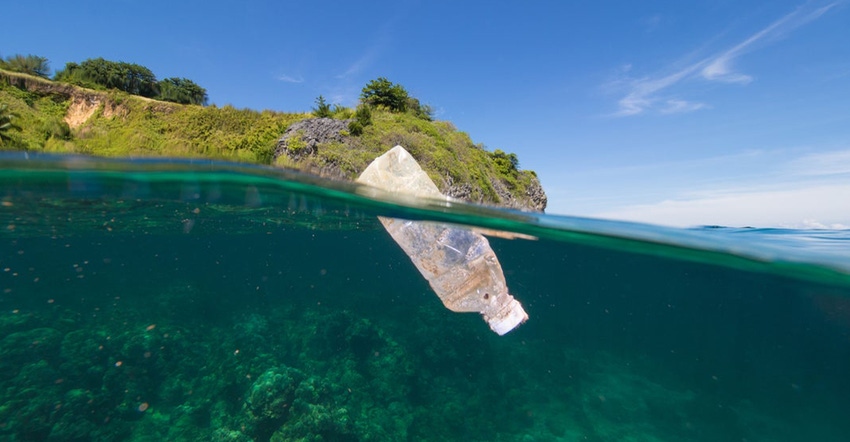Canada Fights to Save its Ban on Single-Use Plastics
The province’s new rules are in alignment with federal single-use plastics regulations, with the banning of six specific plastics recently established at a federal level. A fuller ban on their export is slated for the end of 2025.

As British Columbians prepared to bid adieu to 2023, they also said goodbye to some everyday single-use plastics—straws (with limited exemptions), utensils, and plastic bags were banned Dec. 20, 2023, though some of these items are available by request or at self-serve stations. More clampdowns are coming in 2024.
That’s when businesses in BC can no longer offer single-use food service ware made with polystyrene foam or use PVC film wrap. Also to be scrapped is “oxo-degradable” packaging, which breaks down into microplastics proven to have potential human health impacts; these applications can include common items like dog poop bags, dry cleaning over-bags, tea sachets, and garbage bags.
The province’s new rules are in alignment with federal single-use plastics regulations, with the banning of six specific plastics recently established at a federal level to include stir sticks, plastic checkout bags, cutlery, straws, six-pack rings, and some food service packaging. A fuller ban on their export is slated for the end of 2025.
Many local jurisdictions had already established restrictions on single-use plastics of their own volution —about 21 municipalities in BC alone. And Canada-wide government and public support in general has been strong according to BC Environment Minister George Heyman.
But now there is question as to how the policy will play out at the federal level due to a turn of events. Petrochemical players Dow Chemical, Nova Chemicals, and Imperial Oil, along with the Responsible Plastics Use Coalition, comprised of companies from the plastic industry, filed a court petition arguing that there was insufficient scientific data to justify the restrictions.
By Canadian law, items can be banned if they are listed as toxic under the Canadian Environmental Protection Act, though provinces generally have the authority to write their own policies.
Justice Angela Furlanetto of the Federal Court ruled in the industry opponents’ favor. Her rationale was that in adding the breadth of targeted plastic materials to the toxics list the federal government was stepping out of the boundaries of its assigned authority.
"Not every [plastic] item [on the list] has the potential to create a reasonable apprehension of harm," Furlanetto wrote.
The cabinet order, she said, was “unreasonable and unconstitutional.”
Minister of Environment and Climate Change Steven Guilbeault says the Canadian government is carefully reviewing the ruling and may appeal the decision. He posted on X: "Canadians have been loud and clear that they want action to keep plastic out of our environment. That's what we'll keep fighting for."
Guilbeault goes on to state, “We will have more to say on next steps soon.”
In the Canada Gazette the government reports that during a 60-day public comment period seeking feedback on the proposed plastics clampdown the Department of the Environment fielded written submissions representing the views of 251 stakeholder groups (industry members; provincial, territorial, or municipal governments; Indigenous groups; and non-governmental organizations). Responses also came in the form of emails –24,000 of them—from individual Canadians, as well as comments in a petition with over 100,000 signatures.
Non-governmental organizations and local governments were mostly in support of the regulations though reactions from provincial and territorial governments have been mixed. And while petroleum giants like Dow oppose the legislation, some industry stakeholders have announced or have begun transitioning away from using single-use plastics.
Manufacturers crank out 6.2M tons of plastic products in Canada each year, including 2.3M tons of packaging, according to Statistics Canada. Less than 11% of plastics are recycled, reports the Environmental Defence. At the same time, the federal government has set a target of zero plastic waste by 2030.
Lindsay Beck at environmental law group Ecojustice represented some of the Canadian law’s supporters and stated that in listing plastic as a toxic substance, the government was making a meaningful move toward tackling pollution in reach for zero plastic waste.
One of the most vocal opposers is Alberta Premier Danielle Smith whose province is home to a large petrochemical sector that recently announced $18B in new projects. Smith argued that classifying plastic consumer products as toxic has had “wide-ranging consequences for Alberta’s economic interests and has put billions of investments at risk.”
“We urge [the federal government] to not appeal this decision, and to immediately delete ‘plastic manufactured items’ from the current Canadian Environmental Protection Act so as to avoid further need of legal action by Alberta and other provinces,” Smith said.
On the other side of the coin are the environmental impacts, which themselves have financial implications.
If the proposed regulations are enforced, they should drive a plastics waste reduction of about 1.4M tons from 2023–2032, the Canadian government estimated in a regulatory analysis statement. The analysis estimates $619M in monetized benefits due to reduced investments in litter cleanup projects.
But the proposed regulations are expected to result in $1.9B in present value costs over the same 10-year timeframe. Overall, the analysis projects, the policy would come with $1.3B in present value net cost over 10 years.
In defense of their stand officials wrote: “Given the extent of ecological harm that can be inflicted to wildlife and their habitats from the plastic pollution of the six categories of single-use plastics [targeted by the proposed law], and the reduction of enjoyment of ecosystem goods and services the associated non-monetized benefits are expected to be significant.”
About the Author(s)
You May Also Like




